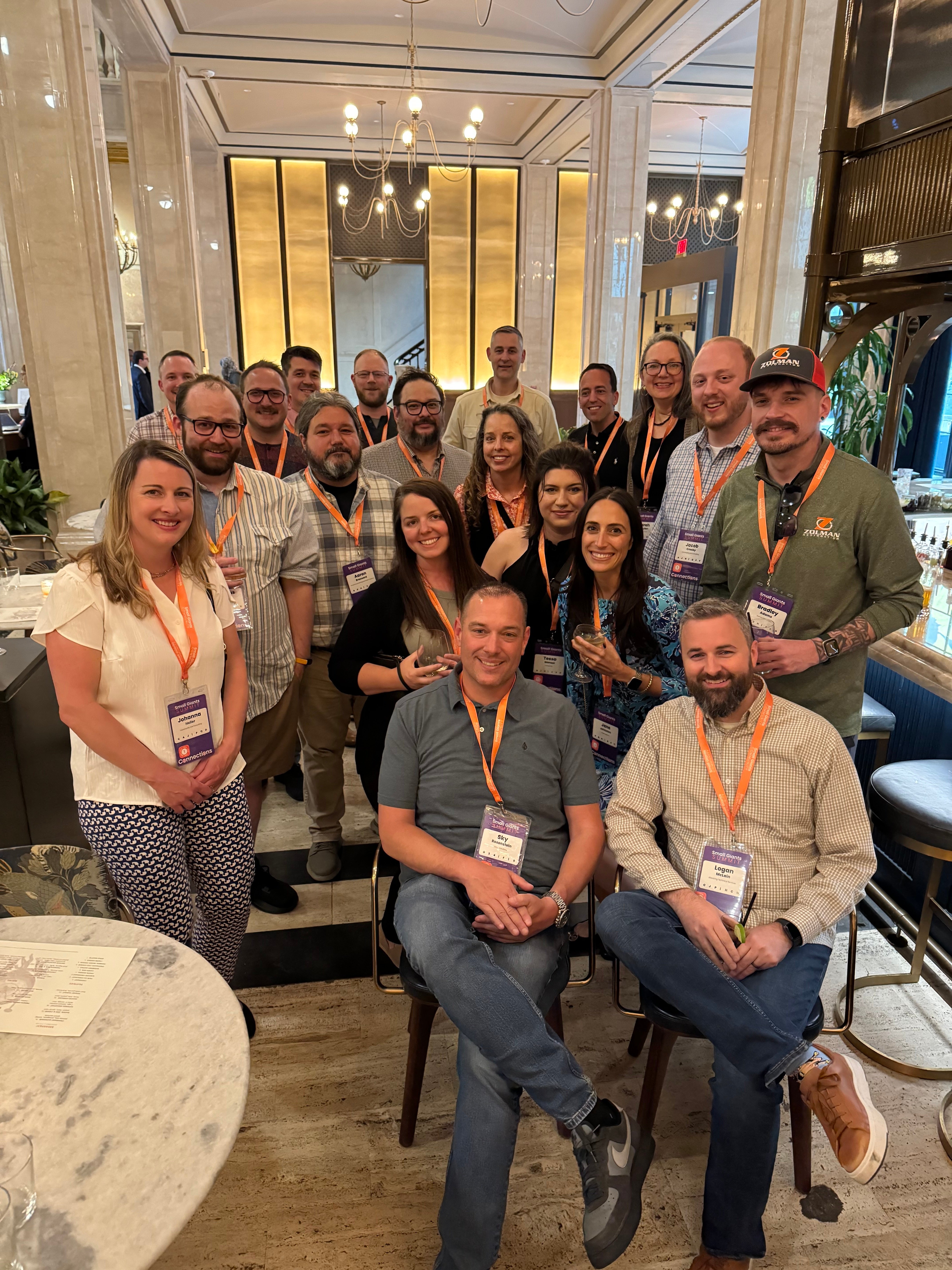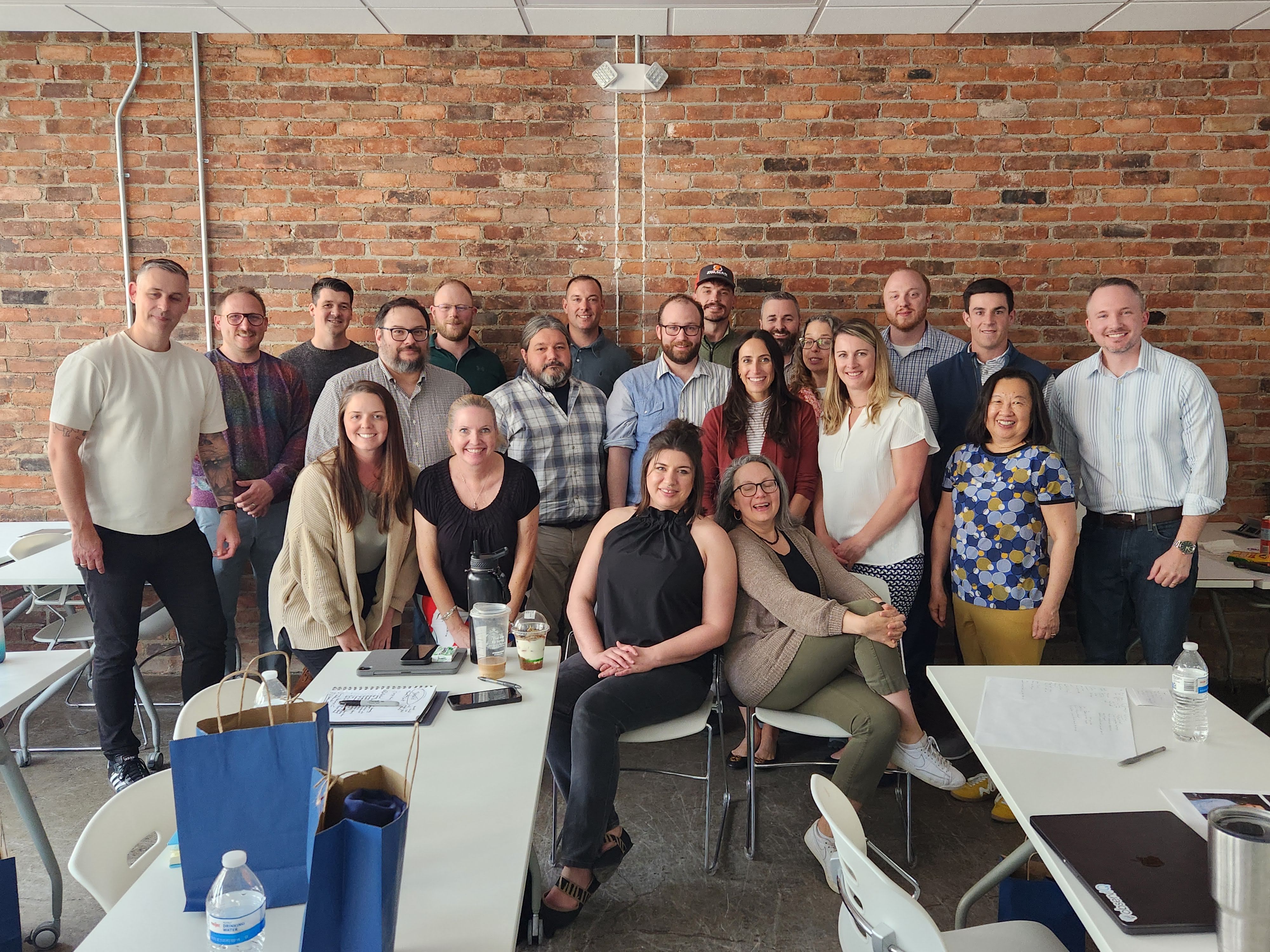
.png)






.png)



.png)

Ready to become the kind of leader who inspires action, drives performance, and builds a thriving company culture? The Small Giants Leadership Academy is a leadership development program designed to build a cohort of confident, empathetic, purpose-driven leaders.
What is Small Giants Leadership Academy?
The Small Giants Leadership Academy is a nine-month virtual leadership development program for Next Gen Leaders who are ready to hone their skills, build deeply rooted connections, and learn from experienced practitioners in the Small Giants Community. You’ll also gain access to a cohort of like-minded peers, an extensive resource library, and event tickets to two Small Giants events.
Small Giants Leadership
Development Curriculum
Over the course of nine months you’ll dive deep into core principles central to being a purpose-driven Small Giant leader and gain practical tools you can take back to your company.
-
Purpose, Vision & Values
Discover your personal purpose and values, and learn how they shape your leadership. While most companies have these articulated for an organization, we’ll look at how your own purpose can tie into your identity as a leader and add value to the organization as a whole.
-
Mindful Awareness
Addressing mental health in the workplace is necessary and unavoidable for a people-focused culture. We’ll explore practical tools and strategies to create an environment that will prioritize awareness and wellness for yourself and your team.
-
Culture of Mattering
Build a culture where vulnerability, learning, and innovation thrive. You’ll discover how to create and maintain a psychologically safe workplace, plus how it benefits healthy, successful organizations in the long-term.
-
The Life Cycle of Teams
Understand the ebbs and flows of teams, from hiring, onboarding, development, and transitions in and out of the company. We’ll share best practices for how to master key stages of an employee’s life cycle, including how to handle tough decisions at both ends of an employee’s tenure with clarity and empathy.
-
Tough Conversations
No matter how many years of experience you have, tough conversations are never easy, and procrastination or avoidance around these topics can undermine a whole company culture. Develop the skills to give and receive feedback with clarity, empathy, and confidence.
-
Connection & Identity
Get ready to learn more about yourself and your own leadership identity. Gain a clearer understanding of how you can also support more inclusive and intentional connections on your team and in your day-to-day work.
-
Accountability
Learn how to balance a fun, tight-knit environment with clear accountability and performance measurement. We’ll share specific methods to inspire high performance, build feedback systems, and track and communicate progress.
-
Impact & Influence
In our reflective session wrap-up, we’ll review how to integrate the Small Giants philosophy into your leadership style, drive meaningful change and action, influence decision-making through storytelling and communication, and leave a lasting impact on your company's culture.
Program Info
January–April
April–May
In-Person Leadership Academy session + Small Giants Summit
June–August
Monthly Online Meetings
September
In-Person Graduation
Benefits of Our Leadership Development Program
You get what you give... and a whole lot more! As most leadership programs go, the more time and care you put into engaging with the curriculum and resources, the more growth you’ll see.
.png?width=650&height=700&name=Leadership%20Academy%20(2).png)
-
Purpose Driven Facilitators
Learn from experienced practitioners and seasoned leaders from Small Giants companies. -
Virtual Learning Sessions
Connect with your cohort through monthly 2-hour video calls to swap stories and develop the toolbox you’ll use as purpose-driven leaders. -
Expand Your Network
Form connections with a cohort of like-minded, purpose-driven leaders from a wide range of industries. -
Online Learning Hub
Access an extensive library of leadership development materials to take back to your organization.
Praise for the Small Giants Leadership Academy
-
"The Leadership Academy changed me as a leader. Now I understand more of the importance of bringing up leaders and allowing them to lead on their own. I've realized that I need to take a step back, be quiet in meetings, and let my team get there on their own. That's what leadership is: creating a culture of multiple leaders within the organization."

Leslie DeMent
Executive Director, McKinney
-
"Small Giants Leadership Academy has provided me with a clear framework for growing a company that balances profit with purpose. I've learned best practices on how to build a people-centric, purpose-driven business that not only thrives but also does good in the world. It has been transformative."

Dan Grech
Founder/CEO of BizHack Academy
-
"Small Giants Leadership Academy came at the perfect time in my professional career. I learned how to develop my company into a purpose-driven organization, which has led to fruitful growth in our team, culture, and customer base."

Anthony Maione
President, Core America
-
"The Leadership Academy showed me practical ways to weave our values into our everyday work."

Torey Carter-Conneen
CEO, American Society of Landscape Architects
-
"We have touched on so many topics this year, and I am able to bring back fresh ideas to my leadership team to have more powerful conversations. I recommend this to anyone that wants to step up their game."

Karolyn Hampton
Director of HR & Recruiting
-
"I feel like the Small Giants Leadership Academy has empowered me as a leader. It has given me tools and a path forward to help strengthen our culture. Everyone on the team has benefited from this."

Brenda McCombs
Chief Compliance Officer, Cordant Wealth Partners
-
"Personally, I've grown so much from this program. I'm being intentional about adopting the traits of an inspiring leader. Every month, I host a monthly training that passes along what I'm learning to the rest of the group — from emotional intelligence to visioning and more."

Katie Spika
CEO of Spika Design & Manufacturing
-
"The Leadership Academy has been truly life-changing for one of our leaders. I am so thankful he had the opportunity to learn and grow in such a positive environment."

Elizabeth Glasbrenner
CEO, Smiley Technologies Inc.
-
"As President, the organization needed to have confidence in me as a leader. This experience has given me validation that I’m a better leader than I think. As my team saw me build my confidence, it helped them have confidence in me, too."

Roy Hernandez
President, Geil Enterprises
-
"In order to value people over profits, it’s imperative that, in business, we are willing to embody transparency. The Leadership Academy gave me the tools to implement open-book management for our organization. So far, it has been overwhelmingly positive."

Brandy Hall
Founder/CEO, Shades of Green Permaculture
-
"I credit much of our success to Small Giants. The leaders we’ve put through the Leadership Academy have grown in incredible ways, gained confidence, and transformed their way of thinking. The Leadership Academy is now a formal part of our next level leadership plan."

Deanna Walker
CEO, Venturity
Get Started with Leadership Academy
What To Expect
- Say Hello
Submit an application to help us understand your leadership journey. Then we’ll hop on a Zoom call to get to know you and discuss the Leadership Academy’s cost and curriculum. - The Decision
We’ll review your application and ensure a good fit before accepting payment and formally welcoming you to the Leadership academy. - Onboarding
Get ready for our January program launch with some final details delivered to your inbox and a welcome goodie box in the mail.
Frequently Asked Questions
-
Who’s an ideal candidate for the Small Giants Leadership Academy?
While we welcome founders and CEOs, this leadership development program is perfect for emerging, Next Gen Leaders—those who are ready to step up and shape the future of their company. Think leadership team members, COOs, and those who influence of culture, people, and operations. Most importantly, participants should have the support and autonomy to implement the leadership development practices they gain from the program.
-
How much does the Small Giants Leadership Academy cost?
The Small Giants Leadership Academy has an investment of $12,500 per participant. This tuition fee is all inclusive, including: program learning access; community access; lifetime resource access; a Summit ticket; and all meals, transportation, and activities for two in-person experiences. (Travel and accommodations for the in-person experiences are not included.)
There is a 10% deposit required upon acceptance to save your seat, and the remainder can be paid up front or monthly over the course of the program.
-
Is my company a good fit for the Small Giants Leadership Academy?
Aligning with the values and philosophies of the Small Giants Community is key. Explore our website and talk to our team to see if it's the right fit for you. Founders and CEOs often find the Leadership Academy is the perfect solution when:
- Your leaders are great, but they need a boost of confidence.
- You're clear on the company's purpose, vision, and values, but you're not sure everyone else is.
- You'd love to start thinking about succession planning, but no one seems ready to step up.
- Your leaders are great at running their departments, but you wish they'd think bigger picture.
- You have a great strategy for people and culture development, but you’re not sure how to get it going.
-
What is the time commitment for this program?
The time commitment averages 4-5 hours per month for the interactive virtual sessions, including a two-hour Zoom workshop, pre-work, post-work, and time with a buddy. Plus, there are two in-person meetups (totaling 5 days) throughout the year.
-
What are the benefits of the Small Giants Leadership Academy?
From a leadership perspective, you'll gain confidence, emotional intelligence, self-awareness, and the ability to lead with empathy and compassion. From an organizational standpoint, you'll gain systems, tools, and resources around culture, performance, transparency, accountability, and impact to take back and apply in your organization. Check out our curriculum above for more details!
-
What does a successful program participant look like?
You’ve created the space and are ready to actively participate in the monthly calls and in-person meetups, complete the pre- and post-work, and are willing to share openly and honestly about your successes and challenges. That's where the magic of a supportive cohort truly shines!
-
What are the timelines for the Small Giants Leadership Academy?
We accept applications from June through November.
The program starts with onboarding in November or December and then kicks off officially in January, running through September with two in-person meetups: one in April at the Small Giants Summit and one in September for the graduation trip.
Get Involved with Small Giants
Discover opportunities to support our community through sponsorship or donations, and explore the exciting speakers, activities, and more at our Summit event.
